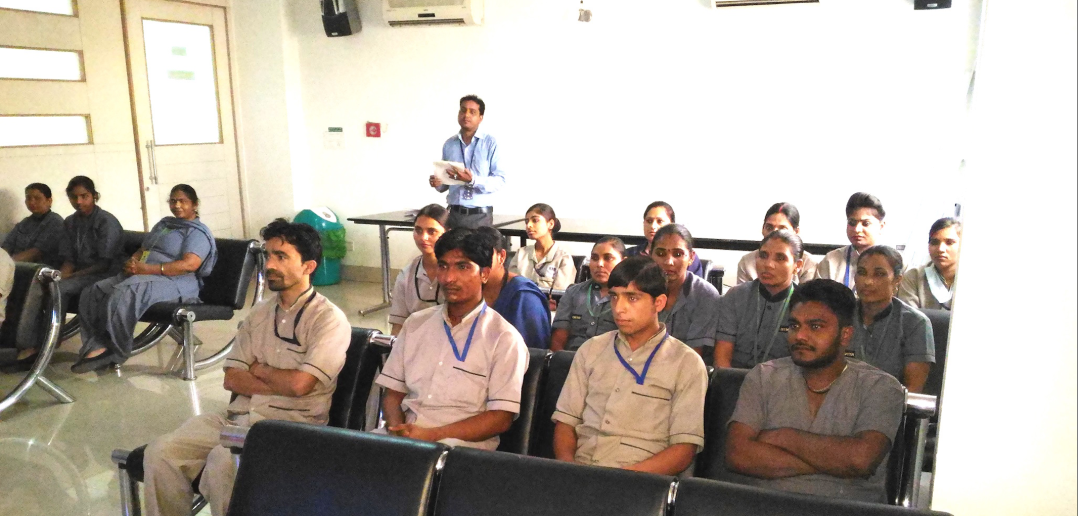Heraud’s approach to training is the result of trans-national collaboration between Australia and India and their unique way of bridging the skill gaps by borrowing from the qualification frameworks of these two countries. In this Skill Story, Shrutikant Banswal, COO, Heraud Training and Education, shares his perspective on adopting standards and benchmarks from countries like the UK and Australia and sustaining the impact on training outcome and jobs in India.
Heraud’s four-pillared approach to training
When we started this initiative, we did a lot of due diligence. We examined the Qualification Packs (QPs) and National Occupational Standards (NOS) from the NSQF while studying the skill gaps. We identified four critical areas that needed our immediate attention to do justice to the domestic training industry.
Infrastructure: Our ITIs and polytechnic colleges are more of brick and mortar buildings rather than representatives of the industry. The training should be delivered in the real life workshops. Or, the laboratory where the training is given, should imitate the industry. Then only we will be able to produce resources for employment on day one. In fact, on-the-job training is an inherent part of all our courses and we try to ensure that all our students get this opportunity for better performance and productivity.

The trainer: The trainer should be recruited from the industry. As of now most of the trainers in ITIs, Diploma colleges and even in Engineering colleges, come from an academic background. How can someone who has never worked in the industry, teach practical, vocational skills? In all our facilities, we only hire people from the industry. For example, in our workshops on automotive servicing, we have trainers with 14 to 15 years of experience in companies like Hyundai or Maruti.
Curriculum and content: It should define and deliver the training as per standards, which reflect the expected outcomes. The content should be developed in consultation with the industry. Traditionally, we were teaching through booklets that were not always updated. Technology is changing very fast, the practices change, global standards change and that’s why there is a need for constant interaction with the industry to enable integration of industry practices into the training.
Quality standards and frameworks: This has to reflect the pedagogy or methodology. So we need to have clear cut audit frameworks so that we are able to achieve quality outcomes at the end, as per our expectations.
To ensure ample hands-on practice, 30% to 50% of our training component is on-the-job training. If the student enrolls for a 3-month training program, one to one-and-half month will be spent in the industry.
Apprenticeship model
For example, in healthcare we have training courses for multiple job roles – operation theatre technician, healthcare administrator and so on.The students spend 3 months at the training center with us and 3 months in the hospital. In some cases they get a stipend and in some cases they do not.
Subsidized training under government schemes
Almost all the subsidized training falls under PMKVY or similar government aided schemes. The MSDE has identified more than 400 job roles, and the information is available on PMKVY website. The response is fairly good. We are training almost 250 to 300 people every month under this scheme and the target is to place 70% of them depending on their interest.
Mobilizing people for training
You need a very strong team to mobilize people at the grassroots level. This includes going to villages, rural-urban fringe areas, and convincing people to enroll in training. Despite the fact that it is free training, it takes a lot of effort to gather people. Even if you mobilize, convince and enroll them, the dropout rate is in the range of 15%-20%, depending on region, due to various reasons – the effort may be too much, the course may not interest them, etc.
Majority of employment in India (90%) is through small and medium scale industry (MSMEs). Major challenge is that the industry is very unorganized, so it is difficult to reach out to so many people. And they are not convinced with the idea of trained workforce. There may be multiple reasons – once the resource gets trained, the expectation is their salaries should also increase as their skill sets improve, they get bored of doing monotonous jobs, so they look for upgrading their skills and utilize them in other jobs.
Support from the industry for better salaries
Once there is enough volume to justify this case, the industry will also take cognizance and reward accordingly. One recent change we have seen is, lot of graduates are realizing that they are not readily employable at the end of their graduation. They come to us to bridge that gap, to get skilled for getting employment.
Support from the government
We are just close to our second year in India, we have trained about 2000 students, and the target is to reach a capacity of 5000 students in the next two years. The response has been good, but we need support from the industry and government to make this happen.
Along with incentives and subsidy, government should also push the industry to hire trained and certified people. The biggest gap in India, which is probably not there in other countries is that almost all skilled persons are certified, qualified and licensed in most developed countries. The government should make people come to various skill development centers, and get themselves trained and certified. It will also have a positive impact on the quality of manufacturing, healthcare, hospitality or any sector. Training should be made mandatory for employment to truly put India on the growth trajectory.














